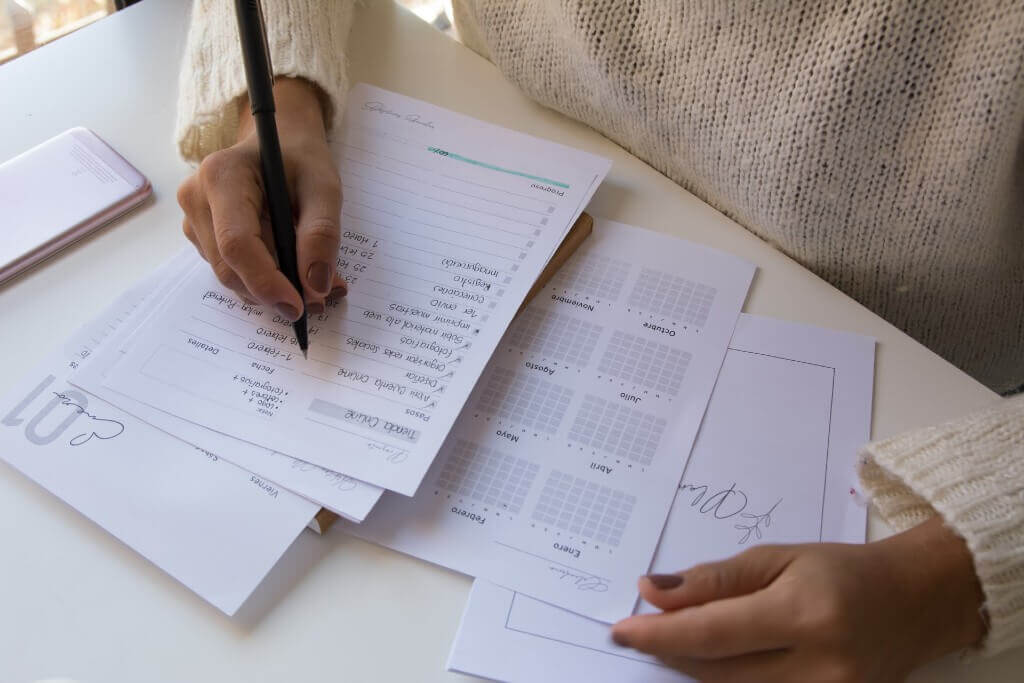Do you have ADHD and struggle with time management? Do you always feel like you can’t get things done, or time sneaks up on you?
It is normal! A lot of people struggle with time management. However, people with ADHD or ADD struggle a bit more. They have difficulty focusing and keeping track of time. But don’t despair— there are good ADHD time management tips and habits that can help you feel more up to your tasks.
ADHD brains see time differently
Time management for people living with ADHD is so tricky because ADHD brains see and process time differently.

This means it is biologically more difficult for someone with ADHD to manage their time well. How does that work?
Stuck in the now
Most people with ADHD are often stuck in the present moment: their brains aren’t able to comprehend future time, only current time.
For example, you can know that right now, you are eating a burrito. But if you try to imagine yourself eating a burrito in two hours, your brain won’t be able to recognize the effort, risks, and rewards that come along with that.
Marking the passing of time
Another thing that makes ADHD time management hard is that ADHD brains struggle with marking the passing of time.
Without looking at a clock all the time, ADHD brains might not be able to measure how much time is passing accurately. This makes it challenging to stay on schedule or estimate how long an activity will take.
How does ADHD affect time management?
The combination of these two factors makes ADHD time management very difficult. Being stuck in the now makes it hard to recognize the importance of future tasks and, thus, harder to want to do them.

Not being able to mark the passage of time also makes it easy to get stuck for too long in one task. This can disrupt a schedule or to-do list.
So putting these two together, it is obvious that time management for people with ADHD is much more complex. So how do you combat that?
How can you manage your time better with ADHD?
By developing good time management practices, understanding your difficulties, and learning how to manage ADHD, you can learn to manage your time better and be more productive.
This usually involves creating schedules, writing things down, creating a plan and sticking to it, and using clocks or other timekeeping devices. It also involves removing as many distractions as possible. Trying a new time management technique from time to time is also a great way to get better. What we recommend for people with ADHD is the Pomodoro technique.
Even if your brain comes up with more distractions, removing as many as possible will help.
There are a variety of tips to help with ADHD time management, and we will get into those shortly.
How can an adult manage their time with ADHD?
Time management tips for adults with ADHD will be very similar to those for kids. Even if your concerns are work and household chores rather than school, the general challenges and solutions are the same.
Let’s look at ways to manage ADD and create better time management practices.
Here are 5 tips on how time management can help a person with ADHD:
1. Schedule enough time for every activity
A common issue for people with ADHD is feeling overwhelmed. You must complete two reports for work, the dishes need to be done, and you want to go for a walk. Soon, it feels like too much.

To help combat this, schedule your days and ensure you leave enough time for every activity.
Make sure to consider not just how long the activity takes but travel time (if needed) and time to transition from one thing to the next.
Although it might seem ridiculous, scheduling your time like this will help prevent you from feeling overwhelmed. It will ensure you have enough time to do everything you need.
Allow extra time when necessary.
Sometimes, things take longer than you thought they would, no matter how carefully you planned. Or something unexpected comes up.
When that happens, it can make time management for ADHD adults challenging. How do you manage your time with unexpected interruptions, especially if your brain is stuck in the now?
One of the best ways to help with this is to schedule extra time into your day. This could be an additional 20 minutes for each activity or an hour at the end of the day with nothing scheduled.
Then if you need it, you have that extra time. And if you don’t need it, you have time to relax or do something else!
2. Carry around a notebook
Carrying a notebook can be a lifesaver if you struggle with ADHD and time management.

You use this notebook to write down anything important throughout the day. Notes, emails that need to be sent, small tasks to complete, a reminder to text your best friend.
Since you’re writing these things down, it removes the pressure on your brain to remember everything.
This will help you feel less overwhelmed and stay on top of your time while still ensuring you do everything you need to do. It can also let you add small notes to your schedule on the go, such as a “phone call from a supervisor at 2:05.”
If you want to take it a step further, you can use multiple notebooks, a different one for each type of activity. For example, one for work, one for home, and one for social events. Or separate work down into different projects and use another notebook for each one.
3. Create a daily to-do list
Creating a to-do list is helpful for anyone but especially for ADHD time management. If you create one every day, it helps you remember what tasks you need to do.

You can go as in-depth as you would like. List out your major tasks for the day, or go as small as details like sending emails, eating lunch, and even getting dressed. It’s up to you.
Just make sure you include anything that has to get done. Then, stick to this list as much as possible, and use it to help keep you on track.
This helps with being stuck in the now as well because you can see a concrete list of what things you have to do later. It can also help you create your schedule for the day.
4. Use a planner
Making use of a planner can consolidate both your daily to-do list and daily schedule. If your planner is large enough, you could use it to do all three previously mentioned tips!

Planners are a great place to write down events, meetings, important dates, and deadlines. This ensures you don’t forget them because you’ll have them written down.
To be most effective, write down things as soon as you learn them to minimize the risk of forgetting. And if you want, you can also use it to create to-do lists, schedule your day, and take notes.
Of course, since you have ADHD, keeping all of those things in one book could get overwhelming. It’s up to you how you plan to use your planner.
5. Use timers and alarms
Because people with ADHD have difficulty marking the passage of time, using timers and alarms can be very helpful.
You might get sucked into one project for hours, sitting down and working. But if you set a timer to stop in 45 minutes and move on to the next task, you can stay on track with your schedule.
To remind you of when to start/stop.
One of the best ways to use alarms is to remind you when to stop or start an activity.

Take a look at your schedule for the day, and set the alarm 5 minutes before the start of every activity. This way, you know you are always ready to move on when necessary.
If you want, you can set alarms to remind you of things like getting water or going to the bathroom. If that’s what you need to help manage your ADHD brain, that’s ok.
To mark the passage of time.
Another excellent use of timers is marking the passage of time. Set a timer if you don’t have a set end time in mind but want to know how much time has passed.
Make sure this timer is large, easy to see, and won’t turn itself off. As long as you can easily see it, you will have a concrete marker of how much time has passed.
Conclusion
ADHD brains see time differently, and this can make managing time difficult. But ADHD time management doesn’t have to be impossible.
If you start incorporating these practices into your daily routine, you might find that time management becomes much more manageable.


